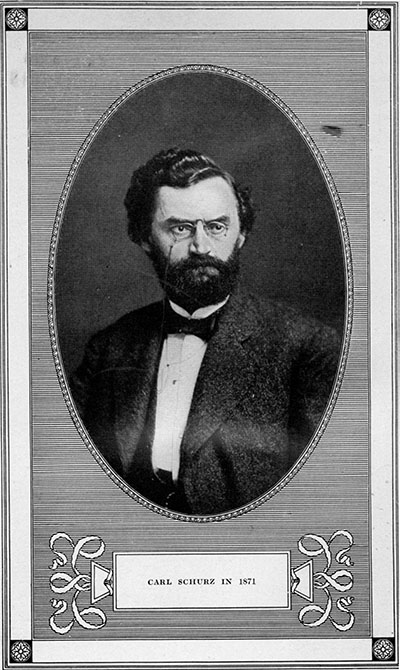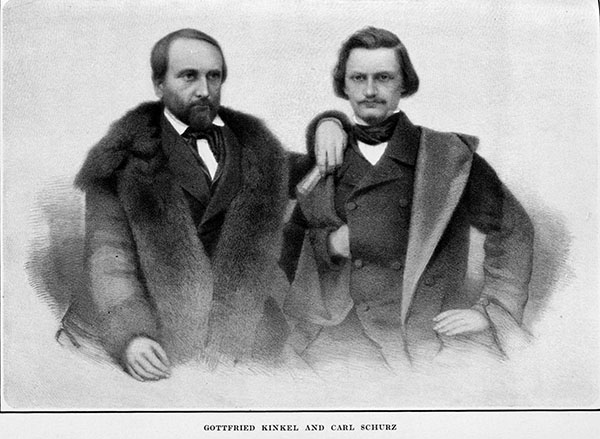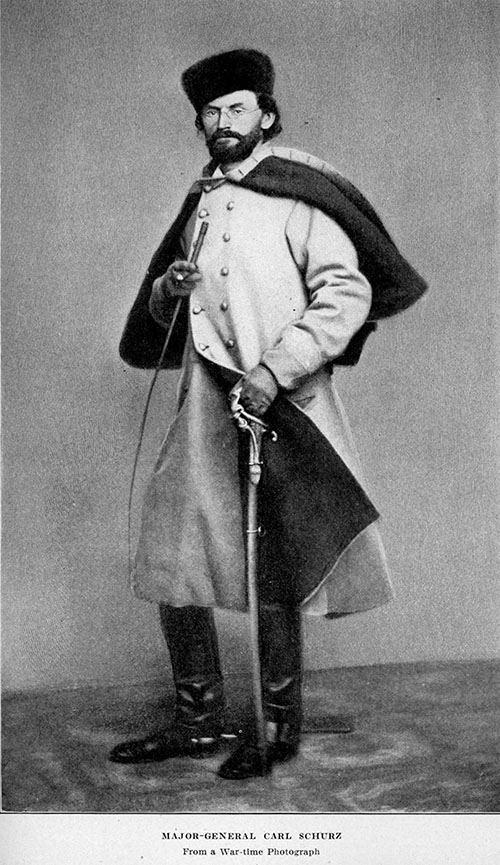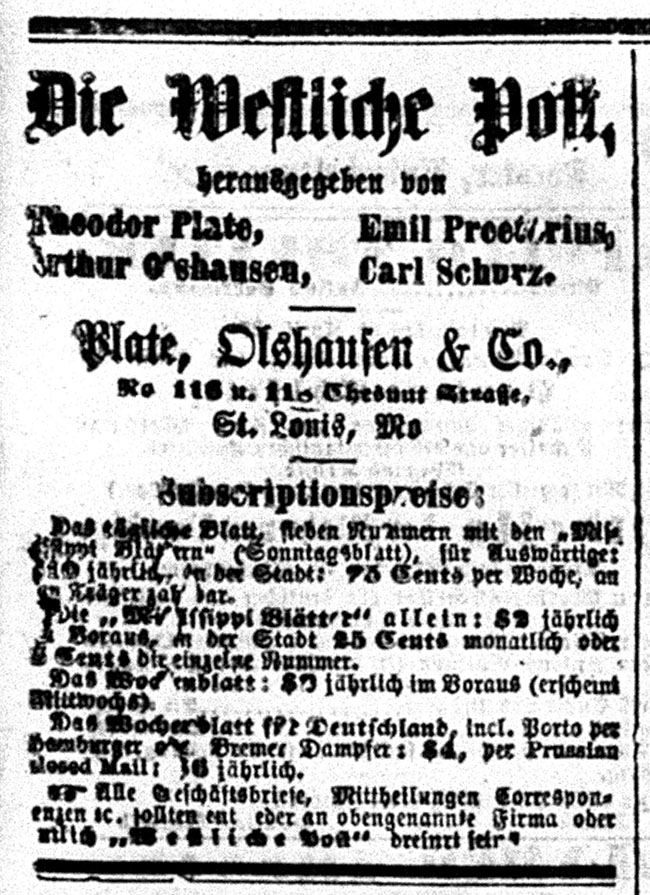
Carl Schurz

Carl Schurz was a Union general in the Civil War, a secretary of the interior, and a US senator. He was born on March 2, 1829, in Liblar (now Erftstadt), a village near Germany’s western border. Carl was one of four children born to Christian Schurz, a schoolteacher and small–business owner, and his wife, Marianne Jüssen. Carl’s father inspired in him a love of reading, learning, and music, while his mother taught him a strong sense of morality and justice. After receiving an elementary education in Liblar, Carl went to a more advanced school called a gymnasium in the large city of Cologne. He had to give up school for a while after his father’s business went bankrupt, but he finished his degree in 1847 after moving to the city of Bonn.
Schurz then attended the University of Bonn, where he studied history and befriended a professor named Gottfried Kinkel. When the Revolutions of 1848 swept into Germany, both Schurz and Kinkel joined the revolutionaries. Schurz edited a pro-revolution newspaper and was an officer in the revolutionary army. After the revolution was defeated by the royal government, Schurz narrowly avoided capture by hiding in a sewer, but Kinkel eventually was captured. After freeing Kinkel from prison in a daring rescue mission, Schurz escaped to Paris in 1850, then to London in 1851. There he married Margarethe Meyer and taught German to support himself and his wife. Carl and Margarethe moved to the United States in 1852 and eventually had five children.
After stops in New York and Philadelphia, Schurz settled in 1855 in Watertown, Wisconsin, where he was a journalist. He also joined the Republican Party; like him, the party was against slavery. Schurz proved to be a masterful speaker and a cunning politician. After running for office twice unsuccessfully, he served as the head of the Wisconsin delegation at the Republican National Convention of 1860. He had great success in rallying German Americans to vote Republican. After the Republican candidate, Abraham Lincoln, won the election and became president, Schurz was appointed as a diplomat to Spain. But he soon convinced President Lincoln to instead appoint him as a brigadier general in the Union Army.
Schurz performed well in the Union loss at the second Battle of Bull Run in August 1862, and, partly due to his political skills, was promoted to major general in 1863. However, Schurz’s troops performed so miserably in the Battles of Chancellorsville and Gettysburg that his reputation never recovered. Schurz spent much of 1864 campaigning for Lincoln’s reelection and never again had a major military command.
When the war ended in 1865, Schurz resigned from the army. He was asked to go on a tour of the South and write a report for Lincoln’s successor as president, Andrew Johnson. Schurz disagreed bitterly, however, with President Johnson’s plans for bringing the southern states back into the Union during Reconstruction, and he quit government service. After a brief run as a newspaper editor in Detroit, Schurz moved to St. Louis in 1867. He edited and co-owned the Westliche Post, a popular German-language newspaper, and employed the young Joseph Pulitzer, who later became one of the nation’s most successful newspaper publishers, as a reporter. Schurz continued to support the Republican Party, and in 1868 he became the first German American elected to the US Senate.
Although Schurz served just one Senate term (1869–1875), he was very influential because he functioned as a spokesman for German Americans, a large and important immigrant population. By 1870, Schurz was publicly attacking the Ulysses S. Grant administration and its power base in Congress, the Radical Republicans, over a high level of government corruption and disagreements concerning plans for Reconstruction. Schurz banded together with a like-minded faction called the Liberal Republicans, which opposed the Radical Republicans. The Liberal Republicans helped get B. Gratz Brown elected governor of Missouri, but they fell apart in Missouri and across the nation after failing to successfully oppose Grant’s reelection bid in 1872.
Politically weakened after his faction’s loss, Schurz lost his Senate reelection bid in 1875. He supported Rutherford B. Hayes’s election run in 1876 (the same year that Margarethe died in childbirth), and was rewarded with the post of US secretary of the interior while Hayes was president. Schurz began reforming corruption within the Department of the Interior, protected natural resources, and eventually changed the policy toward Native Americans away from segregation on reservations and toward assimilation into “mainstream” society. After Hayes’s term ended in 1881, Schurz moved to New York and never held another government position.
Schurz did, however, continue to use his popularity to gain support for political causes. He was an active writer and public speaker, led the National Civil Service Reform League, and from 1881 to 1884 edited and eventually co-owned the Evening Post newspaper. In 1884, Schurz supported the Mugwumps, a Republican political faction that voted for the reform-minded Democratic candidate, Grover Cleveland. In 1900 he officially and finally broke from the Republican Party over its policy of expanding American influence into foreign lands. He spent his remaining years writing his autobiography, living until May 14, 1906, when he died after a period of declining health.
Text and research by Todd Barnett
References and Resources
For more information about Carl Schurz’s life and career, see the following resources:
Society Resources
The following is a selected list of books, articles, and manuscripts about Carl Schurz in the research centers of The State Historical Society of Missouri. The Society’s call numbers follow the citations in brackets.
Articles from the Missouri Historical Review
- Mowry, Duane. “Letters of Carl Schurz, B. Gratz Brown, James S. Rollins, and G. G. Vest et al., from the Private Papers and Correspondences of Senator James Rood Doolittle of Wisconsin.” v. 11, no. 1 (October 1916), pp. 1–20.
Articles from the Newspaper Collection
- “The Anti-Grant Republican Leaders and their Budget of Grievances—The Drift of Our Political Parties.” Missouri Weekly Patriot. January 11, 1872. p. 1, c. 5. [Reel # 49584]
- “The Carl Schurz Idea.” St. Louis Post-Dispatch. June 7, 1907. p. 14. [Reel # 41922]
- “Carl S[c]hurz Passes Away as Day Dawns.” St. Louis Post-Dispatch. May 14, 1906. p. 4. [Reel # 41909]
- “Mr. Schurz and His Platform.” The Bates County Record. August 26, 1871. p. 1, c. 5. [Reel # 3223]
- “An Old Carl Schurz Scandal.” Saint Louis Dispatch. July 24, 1876. p. 1. [Reel # 39315]
- “Presentation of an Address to Senator Schurz.” Missouri Valley Register. March 11, 1869. p. 1, c. 8. [Reel # 26557]
- “Schurz and His Family.” St. Louis Post-Dispatch. February 10, 1881. p. 2. [Reel # 41765]
- “Schurz and the Indians.” Saint Louis Dispatch. November 16, 1877. p. 2. [Reel # 39317]
- “Story of Carl Schurz: How He Effected the Escape of a Political Prisoner.” St. Louis Post-Dispatch. January 1, 1891. p. 8. [Reel # 41805]
Books and Articles
- Fuess, Claude Moore. Carl Schurz, Reformer: 1829–1906. Philadelphia, PA: Carl Schurz Memorial Foundation, 1933. [REF F508.1 Sch87fu 1963]
- Gerber, Richard Allan. “Carl Schurz’s Journey from Radical to Liberal Republican: A Problem in Ideological Consistency.” Mid-America: An Historical Review. v. 82, nos. 1–2 (Winter/Summer 2000), pp. 71–100. [REF 977.3 M584]
- New York Committee of the Carl Schurz Memorial. Addresses in Memory of Carl Schurz, Carnegie Hall, New York, November 21, 1906. New York: Irving Press, 1906. [REF F508.1 Sch87a]
- Schafer, Joseph. Carl Schurz, Militant Liberal. Evansville, WI: Antes Press, 1930. [REF F508.1 Sch87s]
- Schurz, Carl. The Reminiscences of Carl Schurz. 3 volumes. New York: McClure Company, 1907–1908. [REF F508.1 Sch87r v. 1–3]
- Terzian, James P. Defender of Human Rights: Carl Schurz. New York: J. Messner, 1965. [REF 325 Z83]
- Trefousse, Hans L. Carl Schurz: A Biography. Knoxville: University of Tennessee Press, 1982. [REF F508.1 Sch87t]
- Trefousse, Hans L. “Carl Schurz and the Indians.” Great Plains Quarterly. v. 4, no. 2 (Spring 1984), p. 109–120. [REF 978 G7982]
- Tucker, David M. Mugwumps: Public Moralists of the Gilded Age. Columbia: University of Missouri Press, 1998. [REF 301.153 T795]
- Wersich, Rudiger, ed. Carl Schurz, Revolutionary and Statesman: His Life in Personal and Official Documents with Illustrations. Munich: Moos, 1979. [REF F508.1 Sch87we]
Manuscript Collection
- Benecke Family Papers (C3825)
The Louis Benecke Papers section of the collection contains correspondence, legislative and political papers, personal papers, and subject files. Notable correspondents include Carl Schurz, Missouri governors, politicians, government and railroad officials, editors, foreign consuls, and veterans. - Elmer Ellis Papers (C2504)
This collection includes handwritten notes of congressional meetings. Folders 40–42 and 74–82 contain materials relating to Schurz’s handling of Indian policy, including accounts of verbal exchanges between Carl Schurz, Senator Henry Teller, and other lawmakers. - German Club Papers (C3360)
The papers of the German Club contain correspondence and minutes written in both English and German. The papers are partially translated and include programs, menus, elections, degree requirements, clippings, visitors, songs, photographs, and five woodcuts for German Christmas cards. Materials relating to Carl Schurz can be found in volume 3, page 242, and volume 4, pages 129 and 154. - Friedrich Hecker Papers (S0451)
Friedrich Hecker was a Civil War general and a popular member of the St. Louis German American community. Carl Schurz is mentioned in materials in box 2, folder 26; box 3, folder 30; and box 7, folder 70. There are seventeen letters between Hecker and Schurz (in both German and English) in box 3, folder 35. - Mit Fedr Und Hamer! (With Feather and Hammer): The German Experience in St. Louis Records (S0941)
This collection contains photographs used in the exhibit Mit Feder und Hammer! (With Feather and Hammer): The German Experience in St. Louis, held in St. Louis in 1983, and in the Federal Republic of Germany (West Germany) from 1984 to 1989. Box 2, folder 68 contains a picture of the staff of the Westliche Post in the late 1860s, including Carl Schurz. Box 2, folder 77 contains a photograph of Carl Schurz as well as a satirical cartoon of Schurz from a page in the St. Louis humor weekly Puck. Box 5, folder 76, contains a copy of a portrait of Carl Schurz. - James Sidney Rollins Letters (C3014)
Letters discussing Missouri and national politics written by James S. Rollins, a Missouri politician, lawyer, and businessman, to Carl Schurz, US senator from Missouri, 1869–1875, and secretary of the interior, 1877–1881. - Walter Barlow Stevens Papers (C2109)
This collection includes notes and a manuscript concerning Jesse and Frank James, the Youngers, Charley Pitts, and the attempts to stop their lawlessness in Missouri by lawmakers such as Carl Schurz.
Outside Resources
- Biographical Directory of the United States Congress: Schurz, Carl, 1829-1906
This website contains a short biography as well as links to research collections and a list of written works pertaining to Carl Schurz. - Community & Conflict: The Impact of the Civil War in the Ozarks: Post War Politics
This digital collection contains Civil War documents pertaining to the Ozarks region. The website was created through a partnership of several organizations, including the Springfield–Greene County Library District. This link leads to a short essay on the key issues and figures in Missouri politics after the Civil War. Carl Schurz is mentioned. - Library of Congress: Carl Schurz Papers
The Library of Congress holds a collection of Schurz’s papers. This link will take you to the collection’s finding aid.




